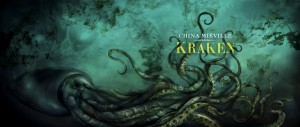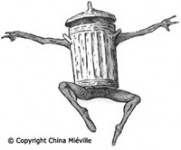My reading week in review: Miéville, Austen, Marcus Samuelsson, Mary Robinette Kowal.
I love how the things we read connect to each other in unexpected ways. But it is not so unexpected that a speculative fiction novel set in the time of Jane Austen would connect with Pride & Prejudice – it is quite deliberate. But it is rather unexpected that – three days after I re-read P&P, Without a Summer would appear on my hold shelf at the library. And since I’d forgotten the premise of the novel approximately 30 seconds after I put it on hold, it was quite surprising to my little brain when I opened it and was reading of proper ladies, gentleman of the peerage, and – oh, yeah – magicians. Good thing I love surprises. I’ve only just started the book (okay, I’m 125 pages in), but so far it’s good. It doesn’t try to be Jane Austen (which irritates me), it just lives in her world (well, her world if it had magic) – and does a good job of it.
Speaking of Pride and Prejudice, I think I figured out why Mr. Darcy has been such an object of female adoration for so long. Long before he was impersonated (quite ably, I might add) by Colin Firth, Matthew MacFadyen* and the like, he was merely words on a page. But such words!

We – or at least *I* – love him because he is articulate. And a critical thinker. And he listens when the woman he loves speaks, and attempts to improve himself when he sees his own faults. And Jane does the same in return. I think this consideration – and certainly the fact that both of them behave so admirably – is highly unusual in any romantic fiction (maybe I’m wrong ). And it’s essential in real life. And it’s DAMNED attractive. Even when he’s angry and humiliated, Darcy writes her a letter that compliments her in many ways and assumes she will give his words a fair hearing, even if she does hate him. At every turn, he treats her as a capable, thinking human being, not an empty-headed ornament. Who doesn’t love that?
I’m not sure where I saw Yes, Chef discussed – Twitter? a Powell’s email? I have no clue – but the story intrigued me. A very young man is adopted out of Ethiopia to Sweden, where he grows up helping his grandmother cook and becomes an award-winning chef in America. I’d never heard of Marcus Samuelsson previous to this (though there are several ways I might have if I paid any attention). His memoir is well-written and a great story of the global village we are living in today – plus lots of travel and food. So if I enjoyed this book knowing nothing about him, I imagine fans of his will be delighted.
*I originally typed this as Angus MacFadyen – an even more attractive actor I also adore. They are apparently unrelated except in some crazy place in my head.



